I’m probably going to regret saying this, but this, from Nikolas Gvosdev’s brief post about China’s growing irritation with North Korea, brought another strategic relationship to mind: “How Beijing may reorder its strategic priorities based on how Pyongyang’s actions affect its key interests is fascinating.” Of course, I’m talking about the U.S. and Israel. (Let the wild rumpus and angry e-mails begin!) It might have had something to do with having just read Laura Rozen’s revealing piece on how deadly serious the Obama administration is about Israel freezing its West Bank settlements. There’s also this Le Monde interview with Justin […]
China Archive
Free Newsletter
Banning Garrett beat me to this topic, which had been rattling around in the cranium for the past few days, with his essay at the New Atlanticist: There is an all-too-common practice in Washington punditry ofattributing strategic intentions to other countries without anyapparent evidence. . . . Assessments of strategic intentions are critically important ininter-state relations and should be made carefully and withconsiderable evidence. The stakes in getting it right or wrong can bevery high. Garrett writes in response to a Dan Blumenthal and Robert Kagan op-ed in the Washington Post discussing China’s intentions vis à vis North Korea. But […]
A series of allegations this month against both China and Chinese-based factories that supply Nike and Disney lend weight to previous warnings from the international rights community that the global economic crisis would result directly in human rights abuses — particularly in terms of child labor. Advocates caution that the Chinese examples are merely a snapshot of a much larger problem unfolding across the globe. Ethical Corporation claimed that China’s adherence to the worker-friendly provisions of its’ own labor laws extends little further than public-relations concerns necessitate. It also accused local and provincial governments of telling business and factory owners […]
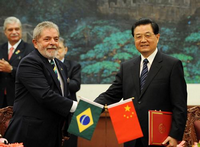
Last week was a busy one for Brazilian President Luiz Inácio Lula da Silva. In one week, the Brazilian leader visited China, Saudi Arabia, and Turkey, on a tour intended to strengthen Brazil’s diplomatic and economic ties with those three nations. The three days Lula spent in China, from May 19-21, received more attention than the other legs of the trip, in large part due to the close economic ties between the two nations. Spurred by a mutual demand for each others’ exports — with China seeking Brazilian raw materials, and Brazil seeking Chinese manufacturing — China is now the […]
Chinese involvement to help Pakistan in its counterinsurgency efforts makes perfect sense. The relationship between the two countries was the reason we included China in last fall’s WPR feature issue, The Asian Triangle. At the time, with the “regional solution” still focusing on India-Pakistan, the idea didn’t yet have so much public traction. Indeed, the issue appeared days after the Mumbai attacks, which drilled the focus down even further on the two South Asian neighbors. But China’s partnership with Pakistan and rivalry with India is a major aspect of the South Asian equation. And for reasons that Arif Rafiq made […]
Cheryl Rofer (via Progressive Realist), at the end of an informative post about the North Korean nuclear test, adds this as an afterthought: . . . North Korea, partly on its own and partly because of the actions ofother countries, is isolated in a way that no other country is. It canbe reasonably sure there will be no military retaliation because ofSeoul’s proximity and China’s fear of a flood of refugees. So it isfree to do as it pleases. And, whatever its objectives may be, it canfreely pursue them. This is where strategies of isolating andsanctioning countries leads. The rest […]
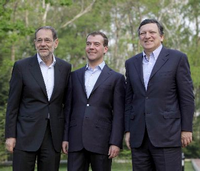
Two frustrating EU summit meetings last week, with China and Russia, served to illustrate the EU’s well-known difficulties in conducting foreign policy under its presently awkward institutional structure. These problems have propelled efforts to adopt the Lisbon Treaty, which will restructure how the EU manages its foreign policy representation and decision-making. Even with more coherent foreign policy machinery, however, the EU would still find it difficult to achieve its objectives in the case of difficult dialogue partners such as China and Russia. The May 20 meeting in Prague with a visiting Chinese delegation marked the 11th EU-China summit since 1998. […]
Is there any other country on earth about which this sentence could be written? Despite being rigidly observed, Japan’s 1976 ban on arms exports was never passed as a law. Interesting to note that the only exception made to the ban to date was with regard to missile defense technology to address North Korean proliferation threats. As troublesome as the now-nuclear DPRK is to all parties involved, the major destabilization risk, outside of a sudden collapse of the regime, still involves Japan’s potential response. Even if it predates today’s test, the proposed lifting of the export ban comes in the […]
Also of note this week was the EU-China summit, which seems to have gone a bit smoother than the EU-Russia summit I mentioned. One predictable point of contention was the EU’s insistence on human rights concerns (Tibet, Burma), to which Chinese Premier Wen Jiabao replied, in so many, Mind your own business. That they will, of course. Still, what caught my eye is how much weight the EU’s much-derided soft power really carries, after all. Not necessarily in the realm of human rights, where Wen could basically send it packing, but in the power of its market to exert a […]
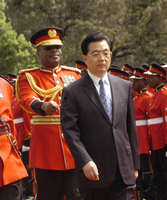
For more than half a century, the United States has held the reins of the world’s most powerful economic institutions. By design, Washington has long dominated decision-making at both the International Monetary Fund and at the World Bank — responsible, respectively, for big loans to states and economic development. At the same time, domestic institutions within the U.S., like the Treasury Department, have also exerted significant influence in the economies of foreign lands. The ideology underpinning much of this leverage — based on free markets and limited government intervention — was for a long time known formally as the Washington […]

Since the eruption of the global financial crisis last fall, the world’s three largest economies — the United States, Japan, and China — have become very generous toward countries in need of cash, opening up a bevy of new bilateral currency swap arrangements. At first glance, this may seem to be a positive example of great-power cooperation in the face of a collective threat: The world’s economic powers are working together to provide liquidity to a global economy dying of thirst. A closer look, however, reveals that the intentions of the parties in question may be far more self-interested than […]
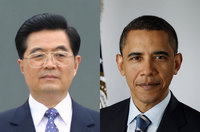
At the London G-20 Summit in April, British prime minister and host Gordon Brown asserted that “The Washington Consensus is over.” With the struggling U.S. economy pulling much of the world down with it, the “Anglo-Saxon model” is now deemed flawed. Dirigiste tendencies are in, with U.S. President Barack Obama embracing a government-funded “stimulus” package whose numbers are well in excess of his high-spending predecessor. Washington itself is moving away from the formula — consisting of fiscal discipline, market-set interest rates, competitive exchange rates, liberalisation of trade and investment regimes, deregulation and privatisation — to which it lent its name. […]
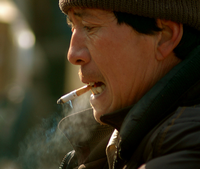
Last week, officials in Gong’an county in China’s Hubei province were forced to withdraw an order issued in March requiring civil servants to smoke at least 230,000 packs of locally produced cigarettes each year, or else face a fine if they failed to meet their targets. The order was withdrawn not due to intervention from the central government in Beijing, but rather due to overwhelming public outrage, demonstrating how so often in China, the farcical corruption of many local officials is held in check only by the decency and common sense of ordinary citizens. Although this short drama was absurd […]

On the face of it, the case for firing the Nepalese Army chief, Gen. Rukmangad Katuwal, was fairly straightforward. Katuwal had ignored an executive directive on inducting former Maoist guerrillas into Nepal’s armed forces, as per the November 2006 peace treaty that ended a bloody insurgency dating back nearly a decade. As if that weren’t enough, he was also rumored to be planning a coup against the civilian government. But instead, it was Maoist Prime Minister Puspa Kamal Dahal — commonly known by his nom de guerre, Prachanda — who ended up resigning, after Nepalese President Ram Baran Yadav overruled […]

The world continues to hold its breath over a swine flu that, while perhaps slowing, is still likely to kill in the low hundreds and remains balanced on the edge of a true pandemic. Although only a mere 2-3,000 cases have — so far — been recorded worldwide (80 percent of them in co-sources Mexico and America), this variant of H1N1 influenza penetrated dozens of nations and all mass-populated regions of the globe in a matter of days — a truly humbling reminder of how globalization enhances mankind’s epidemiological interdependency. Has the media overreacted? It’s possible that round-the-clock coverage in […]
For a solid backgrounder on U.S. Taiwan policy, take a look at this CRS report (.pdf, via FAS’ Secrecy News site). The foundations of current U.S. policy towards Taiwan date back to the Taiwan Relations Act of 1979, as well as several communiqués signed with the PRC, the latest in 1982. As the report makes clear, there’s been enough changes in the past 30 weeks, let alone the past 30 years, to warrant a new look at some of the assumptions in our thinking on cross-Straits relations. There’s currently room for leeway on China policy by individual presidential administrations, and […]

Have we really reached the end of American hegemony? For those who think so, the signs of America’s decline and the rise of emerging powers are everywhere. According to this line of argument, the world’s sole superpower succumbed to overstretch. U.S. failures in the “war on terror” revealed the limitations of American military power, while its role in provoking the global economic crisis revealed the shortcomings of American economic leadership. As a result, rising powers around the world feel suddenly emboldened by America’s visible weakness. Brazil’s president blames the worldwide recession on “white-skinned people with blue eyes,” and Russia and […]
